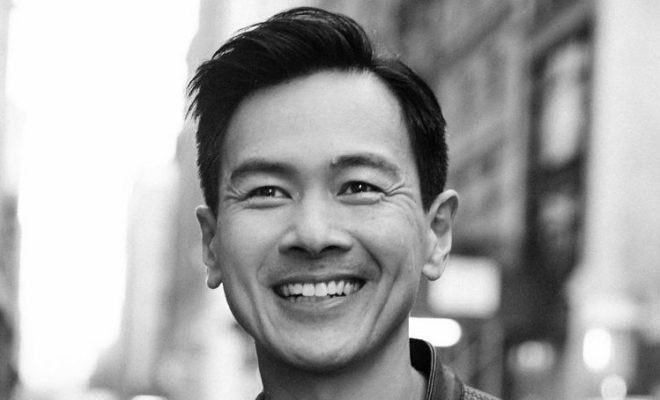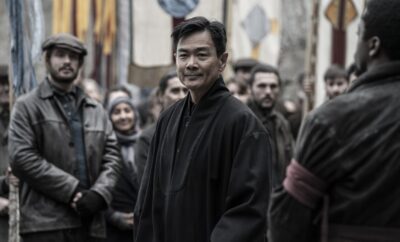
Interviews
Joel de la Fuente – The Man in the High Castle
By: Jamie Steinberg
Q) What are the recent projects you are working on?
A) I have continued to tour Jeanne Sakata’s one-person play Hold These Truths when not shooting “High Castle.” We recently completed runs of the play in the Berkshires at the Barrington Stage Company and at the historic Cultch in Vancouver, the city we shot “High Castle” in. I will also be reappearing on the NBC show “Manifest.” Other than that, I am excited to see what arises.
Q) What can you tease is new this season on “The Man in the High Castle” and with Kido?
A) In Season 4, Kido is put in situations where he is forced to question his whole belief system. When you have made huge sacrifices and committed terrible acts because of your beliefs, re-examining them can take on life-or-death consequences.
Q) There is a darkness to Inspector Kido. What is your personal process like to get into character?
A) I think it’s always hard to get into a character’s skin when you rely too much on adjectives. I always return to what he does and what he tries to do. It gets me away from the trap of playing him as “dark” or “intense,” “scary” and “bad.” I think those descriptions come later.
In the end, Kido has a strong sense of what he thinks is right and wrong and he adheres very strongly to that code; it informs his every action. I think it is because of that that people find him intriguing. He does not enjoy doing some of the more gruesome things viewers have seen him do, but he does them out of his belief that it is for a cause he believes is right.
Q) Villains never see themselves as doing wrong. It’s more for the greater good. This has been quite the debate amongst the fandom when it comes to Kido. How does he justify his behavior?
A) Ha. I started to touch on this in the last question. There is a great quote I came across right when I started working on “High Castle,” Richard Grenier (mis)quoting George Orwell: “…people sleep peacefully in their beds at night only because rough men stand ready to do violence on their behalf.” That’s Kido. In his mind he allows the women and children of Japan to sleep peacefully in their beds. He pays the cost for that.
Q) Going into this season, was there someone(s) you were hoping to share more scenes with?
A) I am such a fan of the actors on the show! It’s been a real honor to get to work with Cary [Hiroyuki Tagawa] for so many of my scenes. Rupert [Evans]and Rufus [Sewell]. Alexa [Davalos]. Tiio Horn as Gina. Brennan [Brown]. Because of the world’s geography, I missed out on anything with Chelah [Horsdal]. Ken Tigar. Stephen Root. That makes me sad, but I did get a front-row seat in getting to watch them.
Q) Despite being fellow countrymen, what is it about Kido and Tagomi that keeps these two at odds with one another?
A) You mean other than the fact that Tagomi frequently commits treasonous acts by pursuing a relationship with Juliana Crain and sharing secret relationships with people in the Reich? [laughs] They are ideologically opposed and they are of different classes. Tagomi comes from privilege; Kido does not. Really, they are set up to not like one another. So, to me, the interesting thing becomes: Why *are* they drawn to one another? What is that deep level of grudging respect that grows between them? For me, a lot has to do with the fact that, in the end, both men love Japan and would give their lives for the Empire; they just go about it in completely different ways. The other thing is: Cary is impossible to dislike. How could you dislike Cary?!?
Q) The relationship between Frank and Kido is kind of a tet-a-tet. How did you work to play off one another?
A) Similar to Tagomi, Kido begins with a certain point of view about Frank (Rupert Evans), which changes over the course of three seasons. Frank and his beliefs make Kido realize that Frank is worthy of his respect. It takes time and it does not change the inevitability that one of them must die, but Kido is forever changed by his relationship with Frank. When you watch what Kido does after he and Frank say goodbye in the desert there is a subtle but profound shift in who Kido is. Frank, and Rupert who played him, makes that happen.
Q) Talk a bit about working with Alexa Davalos, who plays the ever-allusive Juliana.
A) Alexa works as hard as anyone I have been on set with. She is a fierce advocate of the story she is trying to tell. She wears her heart on her sleeve.
Q) What have been some of your favorite episodes of “High Castle” to film?”
A) In Season 1 I loved Episode 2 and all my interactions with Frank. And then I loved the end of that season where you begin to see Kido’s unique belief system: he would rather cover-up the real attempted assassin of the Crown Prince and commit suicide than put Japan in a war he knows they will lose.
Season 2 I love Kido’s growing relationship with Tagomi and his relationship with Gina (Kaniehtiio Horn).
Season 3 sees Kido’s relationships with Frank and Gina reach their conclusions and Season 4 shows the effects of all of his life choices. A fun series of arcs.
Q) What did you personally take away as a bit of memorabilia from your time on the show? (i.e. Kido’s glasses, his hat, something from his office, etc.)
A) I took my glasses, of course! To me, there was nothing more essential, more iconic to this character than Kido’s glasses.
I was also gifted one of Kido’s suits, something I love but cannot envision me ever wearing again. Unless I was Kido!
Q) What has it meant to you to have been a part of such an iconic series?
A) It will always be a huge honor to be associated with this show. Everyone involved put it all on the line for “High Castle.” We pushed ourselves; we pushed each other. We struggled with the ambition of what we were trying to accomplish. We risked failure every day. I can’t say enough how much I value being a part of that and with these people.
Q) You are a part of social media. Do you enjoy the fan feedback you receive to the series?
A) When I was growing up, I loved watching films, TV shows and going to plays. I would research shows I loved and collect memorabilia. So, when I am on social media, I try to engage people the way I would have liked to be engaged. It’s fun for me. I love hearing from people.
Q) What would you like to say to everyone who is a fan and supporter of you and the work you do?
A) Acting is a funny craft because it is never complete until the audience is added. It’s nothing without an audience. So, I am grateful for those who complete this process, who support it, who engage. It’s something, in the end, we finish together.





You must be logged in to post a comment Login